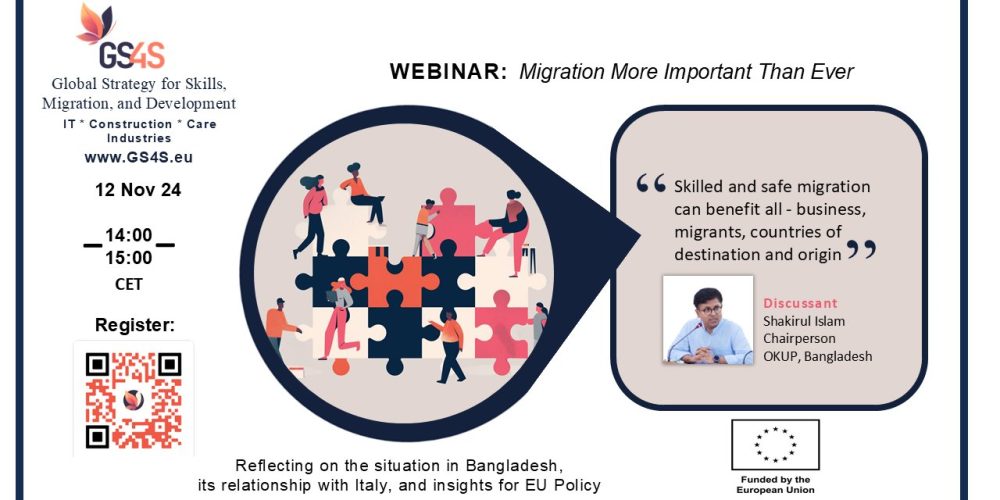On November 12, 2024, OKUP participated in a webinar organized by the Horizon Europe project ‘Global Strategy for Skills, Migration, and Development’ (GS4S) in collaboration with the European Commission. Titled “Migration More Important Than Ever: Reflecting on the Situation in Bangladesh, its Relationship with Italy, and Insights for EU Policy”, the event brought together migration experts, policymakers, and grassroots representatives to examine the current migration challenges in Bangladesh, its evolving relationship with Italy, and the impact on EU policy.
The webinar follows significant developments in migration policy. On July 8, 2024, the European Commission launched the “Supporting a Talent Partnership with Bangladesh” program, aimed at creating safe, regular, and mutually beneficial migration pathways between Bangladesh and the EU. However, an unexpected political shift in Bangladesh on August 5 has created a new layer of uncertainty in the migration landscape, raising important questions about how these changes may influence migration dynamics and policy.
During the webinar, OKUP’s Chairperson, Shakirul Islam emphasized that labor migration has become a critical economic strategy for millions of Bangladeshis facing high unemployment and climate-related vulnerabilities. With Bangladesh ranked among the world’s highest labor-exporting countries, he highlighted the urgent need for safe and dignified migration pathways. Shakirul addressed the systemic issues in the recruitment process, where unethical practices and exorbitant fees—sometimes amounting to 20,000 euros—trap migrants in cycles of debt and exploitation. Reflecting on findings from OKUP’s 2018 research, he noted that Bangladeshi migrants often resort to irregular channels out of desperation, especially when limited legal avenues are available. He also cited the dangerous conditions many face when crossing the Mediterranean in search of stability and employment in Italy.
Shakirul also discussed how the European Commission’s Talent Partnership with Bangladesh has the potential to curb irregular migration and provide legal alternatives, but he urged that current policies must be backed by stronger governance and regulatory frameworks to protect migrant rights. He called for a coordinated, market-driven approach to recruitment that includes transparent systems and accredited skills training in Bangladesh, creating an employment-ready talent pool for EU countries and reducing the influence of informal recruitment networks. Through these ethical practices, Shakirul argued, migration can be beneficial for both host countries and migrant workers.
The webinar concluded with a call for increased collaboration between European countries, Bangladesh, and civil society organizations like OKUP to ensure migration remains a source of opportunity rather than risk for vulnerable communities. OKUP remains committed to advocating for dignified migration pathways and supporting initiatives that prioritize the welfare of migrant workers and their families.
For more updates and information on OKUP’s work, please visit our website and follow us on social media.


